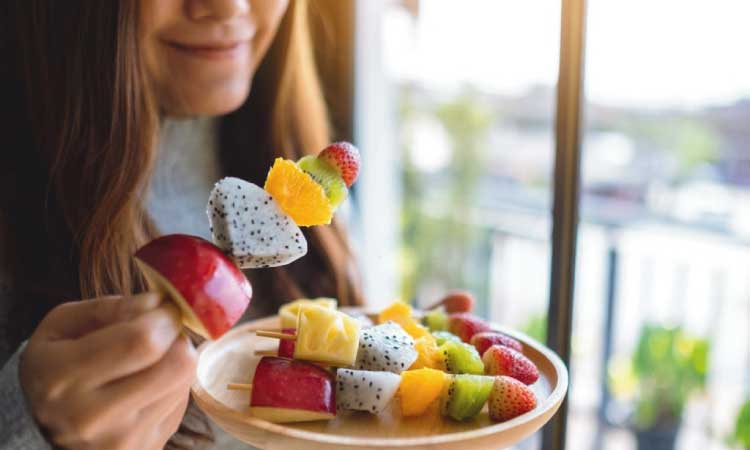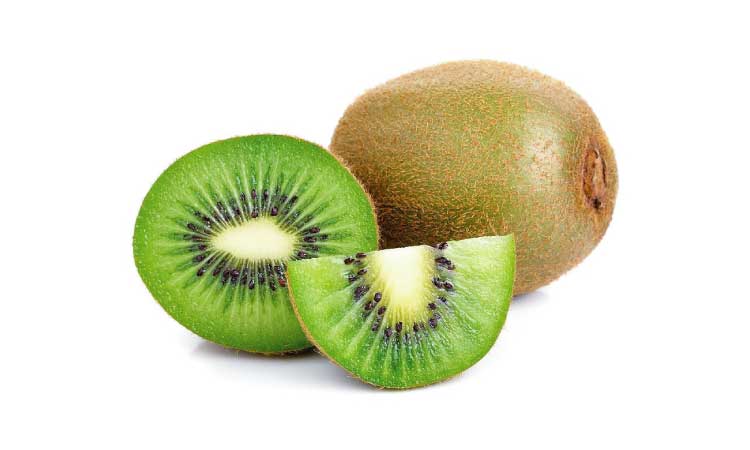It’s a common advice that pregnant women should increase their intake of fruits and vegetables. Are you craving Kiwi during pregnancy and wondering if you should eat Kiwis during pregnancy? Here’s the good news: Kiwi is packed with nutrients that may be beneficial for pregnant women. Vitamins, dietary fibers, proteins, and other nutrients make Kiwis a healthy pregnancy food.
Kiwis are brown fruits with furry appearances. You can use it in salads, in cake toppings. Kiwi fruit can also satisfy cravings for sweets in pregnant women since, despite being sweeter than white granulated sugar, the natural fructose in Kiwi has little impact on blood sugar. Pregnant women love its slightly tart-sour taste and pleasantly sweet flavor. This article discusses the benefits of Kiwi fruit during pregnancy as well as its possible side effects
Is Kiwi Safe During Pregnancy?
As long as you don’t have an allergy to Kiwis, you can eat them while you’re pregnant. Please be aware that Kiwis can trigger allergies in people allergic to pollen or latex. Unless you have an allergy to Kiwis, it is perfectly safe to eat Kiwis during pregnancy.
Kiwis should still be subject to good food safety practices. Before eating, you should wash them thoroughly and never eat Kiwis that are damaged or bruised. It’s best to eat Kiwis as fresh as possible. When you’re expecting, you shouldn’t eat pre-cut Kiwis or pre-made salads with Kiwis.
Related Reading: 21 Pregnancy Superfoods To Include In Your Pregnancy Diet
There are two main Kiwi fruit varieties on the market: yellow or golden and green. Since golden Kiwis produce more nutrients, they tend to cost more than green Kiwis. From this standpoint, we can say that golden Kiwi during pregnancy is more beneficial than green varieties.
Nutritional Profile Of Kiwis
According to the source, 100 grams of Kiwi contains:
- Vitamin C: 92.7 mg
- Dietary Fiber: 3 grams
- Vitamin K: 40.3 mcg
- Vitamin E: 1.5 mg
- Potassium: 312 mg
- Choline: 7.8 mg
The Kiwi fruit is rich in dietary fiber. It is also a rich source of potassium, folic acid, and vitamins C and E, as well as carotenoids, antioxidants, and trace minerals. It contains more potassium than a banana. The vitamin C content of Kiwi is more than an orange. Kiwis are rich in vitamin E and alpha-linoleic acid, an essential fatty acid.
Calculate Due Date With LMP
Related Reading: 10 Health Benefits And 4 Risks Of Eating Banana During Pregnancy
Benefits Of Eating Kiwis During Pregnancy

Kiwis are packed with vitamins and antioxidants, making them a healthy fruit choice. Due to its tart taste, pleasing texture, and low-calorie count, it makes for an ideal fruit during pregnancy.
The following are some amazing benefits of eating Kiwi during pregnancy:
1. Kiwis are loaded with folate
Folic acid contributes to the fetal brain’s development. Early in pregnancy, a woman must consume 400 to 800 micrograms of folic acid for the growth and development of the fetus1. Folic acid contributes to the development of the brain and nervous system while preventing birth defects in unborn babies. As Kiwifruit is a good source of folate, it is beneficial for expectant mothers.
2. A great source of vitamin C
Kiwi is incredibly rich in Vitamin C. Vitamin C is essential for
- Creating neurotransmitters, which are critical for the brain function of the baby
- To protect the expecting mother from free radicals
- Improving energy levels
- Increasing immunity
- Producing collagen, which is necessary for the formation of connective tissues in the fetus
3. Enhances digestion
During pregnancy, constipation can be a problem. Kiwi fruits are packed with dietary fiber, which helps combat constipation during pregnancy. Eating Kiwi during pregnancy third trimester can improve digestion, smooth bowel movements, and relieve discomfort caused by gas, bloating, and flatulence. Kiwi fruit also contains prebiotics, which stimulates the growth of probiotic bacteria to promote overall gut health.
4. Kiwis are rich in calcium
Calcium is crucial not only for the development of the bones and teeth of the developing fetus but also for the development of its muscles and heart as well. Kiwis are high in calcium. The high calcium content of Kiwi makes it a superior source of calcium for lactose-intolerant mothers who are seeking non-dairy calcium sources.
Related Reading: Top 10 Calcium Rich Foods For Pregnancy
5. Suitable for women who have gestational diabetes
All fruits, including Kiwi, contain sugars that can help satisfy the mother’s sweet tooth. Unlike most fruits, Kiwis contain little sugar, approximately 5g in 100g. As it has a low glycemic index, it does not cause significant insulin spikes. Thus, women with gestational diabetes can eat these Kiwis without worrying about raising their blood sugar levels2.
6. Kiwis promote cardiovascular health
The health of the mother’s cardiovascular system is very important during pregnancy. Blood pressure management in itself prevents a lot of pregnancy complications. Kiwis are an excellent way to maintain cardiovascular health during pregnancy since Kiwis are known to thin the blood and lower fat levels.
Kiwi fruits are high in potassium and thus can effectively lower blood pressure. There has been scientific evidence that the bioactive substances found in Kiwi can lower blood pressure significantly.
7. Benefits from vitamin K

Kiwis contain significant levels of Vitamin K, which promotes healing and aids blood clotting. As the delivery date approaches, it is important to ensure that the body has sufficient levels of this vitamin.
8. No weight gain
Because Kiwis are low in calories, you don’t have to worry about gaining weight while eating them. Excessive weight gain during pregnancy can lead to diseases such as gestational diabetes and hypertension.
9. Boosts Immunity
The Kiwi is nutrient-rich, and it is rich in vitamin C3. Vitamin C plays an important role in boosting your immune system. According to one study, Kiwifruit appears to improve immune function and reduce the risk of developing colds or flu.
10. Reduces the risk of stretch marks
Kiwifruits have a high vitamin C content, which helps promote the production of collagen, thus improving the elasticity of the skin. This reduces the chances of getting stretch marks. When consumed regularly during delivery, this fruit may help prevent or reduce the severity of stretch marks.
Related Reading: 13 Home Remedies To Prevent Stretch Marks During Pregnancy
Side Effects Eating Of Kiwi Fruit For Pregnant Women
Rarely, some people can develop an allergy to Kiwi either after eating it. People allergic to latex are prone to Kiwi allergies. This is one of the major side effects of Kiwi fruit for pregnant women.
It is advisable to keep away from Kiwis in such cases. Stop eating Kiwi if you experience signs of allergies. You shouldn’t experiment during pregnancy.
Excessive consumption of Kiwis during pregnancy can bring about:
- Intense itching and tingling in the oral cavity and throat. This can lead to inflammation of the lips and tongue (oral allergy syndrome).
- Asthma
- Acute urticaria
- Rashes
- Hives
- Dermatitis
- Stomach pain
- Diarrhea
- Vomiting
Another two major side effects of excessive intake of Kiwis are:
- Pancreatitis: Kiwi is high in vitamin C and vitamin E. It also contains a considerable amount of potassium and serotonin. Excessive intake of Kiwis can alter blood triglyceride levels and endanger the pancreas down the road.
- Interact with medicines: Kiwi fruit contains anti-fungal properties and, when paired with anti-fungal medications it can pose a risk of overdose. Likewise, if taken with specific types of drugs, excessive intake of Kiwi increases the chances of bleeding
Related Reading: 15 Fruits Not To Eat During Pregnancy
How Many Kiwis Should I Eat A Day While Pregnant?

The consumption of Kiwi during pregnancy is not restricted in any way. However, pregnant women should practice moderation when it comes to Kiwi consumption. Two or three Kiwi fruits are safe to eat each day. When pregnant, eating too much Kiwi fruit can lead to health problems.
Selecting And Storing Kiwi Fruit
Following are some tips that can assist in buying and storing Kiwis during pregnancy so that you can reap the above-mentioned health benefits.
Selecting
There are a few things to consider when selecting Kiwi fruit:
- Pick plump and slightly soft fruits
- Harder Kiwis have an unappealing taste because they are unripe and sour
- Do not buy bruised, shriveled, or moldy Kiwis
- When buying Kiwis, you should also smell them. The best Kiwis are those that emit a fragrant, citrus scent, rather than those that emit a pungent, sweet smell, which most likely means they are overripe
Storing
The Kiwis should be stored in a fruit basket away from direct sunlight if you are planning to eat them immediately.
- Put them on the counter with apples, bananas, or pears, or store them in a paper bag at room temperature for a few days to ripen faster
- Kiwi fruits should be stored in the refrigerator to delay ripening. Kiwi fruits can be kept in the refrigerator for three weeks
FAQS
Dried fruits are easy to store, pack, eat and carry to work. During pregnancy, dried Kiwi makes for a convenient and healthy addition to the daily diet for so many working women. As Kiwi slices are dehydrated, their water content is reduced to a minimum, making them denser, chewier, and more nutrient-rich.
However, dehydration also increases the calories, sugar, and fat content of Kiwis. Therefore, it is not recommended to eat dried Kiwis during pregnancy.
Kiwifruit can be eaten unpeeled as long as they are thoroughly washed before eating. Unpeeled Kiwifruit is more nutritious. Kiwi fruit skins are loaded with fiber, which is beneficial to the digestive system.

